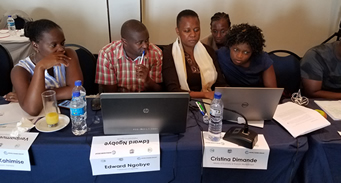- April 6, 2018
- Posted by: admin
- Category: Current News

 The Debt Sustainability Framework for Low-Income (LIC DSF) was developed jointly by the World Bank and the IMF in 2005 as a tool for assessing the risks to public debt sustainability, as well as guiding countries’ borrowing and creditors’ lending decisions. Several developments have, however, occurred since the tool was developed, resulting in significant gaps. For example, major shifts in the international development financing landscape have created new opportunities and options for countries to access alternative mechanisms for financing development beyond the traditional sources. These include non-traditional bilateral partners, as well as other less concessional flows.
The Debt Sustainability Framework for Low-Income (LIC DSF) was developed jointly by the World Bank and the IMF in 2005 as a tool for assessing the risks to public debt sustainability, as well as guiding countries’ borrowing and creditors’ lending decisions. Several developments have, however, occurred since the tool was developed, resulting in significant gaps. For example, major shifts in the international development financing landscape have created new opportunities and options for countries to access alternative mechanisms for financing development beyond the traditional sources. These include non-traditional bilateral partners, as well as other less concessional flows.
In addition, new instruments have been developed to leverage the involvement of the private sector in infrastructure financing, such as public-private partnerships.
As a result, developing countries are increasingly exposed to a wide range of vulnerabilities, including those arising from market volatility and contingent liabilities. Against this background, the World Bank and IMF reviewed the LIC DSF to incorporate tools for assessing these market-related vulnerabilities. The Revised framework was approved in September 2017 by the Boards of the two institutions and will be rolled-out in July 2018.
In order to disseminate the Revised LIC DSF and impart knowledge and practical skills on its use, MEFMI in collaboration with the World Bank and IMF, organized a regional training at Hotel Cardoso in Maputo, Mozambique, from 5 to 9 February 2018. One of the most important outcomes of the workshop was that the country officials gave feedback on how the revised framework could be enhanced, highlighting specific needs and concerns to be considered for inclusion in the final version of the framework. The participants also acquired knowledge and practical skills required to effectively use the revised LIC DSF tool to conduct a typical debt sustainability analysis.
Participants in the workshop were mainly drawn from Ministries of Finance, Planning and or Economic Development as well as Central Banks. There were also participants from the Auditor-General’s office and Parliamentary Budget Services. A total of 48 participants from eleven (11) MEFMI member countries attended the workshop, with females accounted for 62.5 percent (or 30) compared to 37.5 percent (or 18) male.
The workshop was officially opened by the Deputy Director of the National Treasury responsible for Public Debt Management, Mrs. Ester dos Santos José, on behalf of the Permanent Secretary for the Ministry of Economy and Finance in Mozambique. In her remarks, Mrs. José commended MEFMI’s strong partnership with the World Bank and IMF, which she said has been useful in delivering coordinated interventions that contributed to the common goal of building and strengthening capacity in public debt management in Eastern and Southern Africa. Speaking at the same event, the Director of Debt Management Programme at MEFMI, Mr. Stanislas Nkhata noted that the workshop was taking place against a background of significant increase in public debt levels of most sub-Saharan African countries. Even in cases where debt levels have remained relatively low, he noted that the evolving development financing landscape has exposed countries to a different set of cost and risk characteristics which require regular training of country officials to enhance their capacity to assess implications of the dynamic development financing environment to debt sustainability. The World Bank and IMF said the revised framework provides a sound framework for countries to appreciate the main drivers of recent debt trends and understand their interlinkages with macroeconomic variables as a basis for designing appropriate policy responses.
